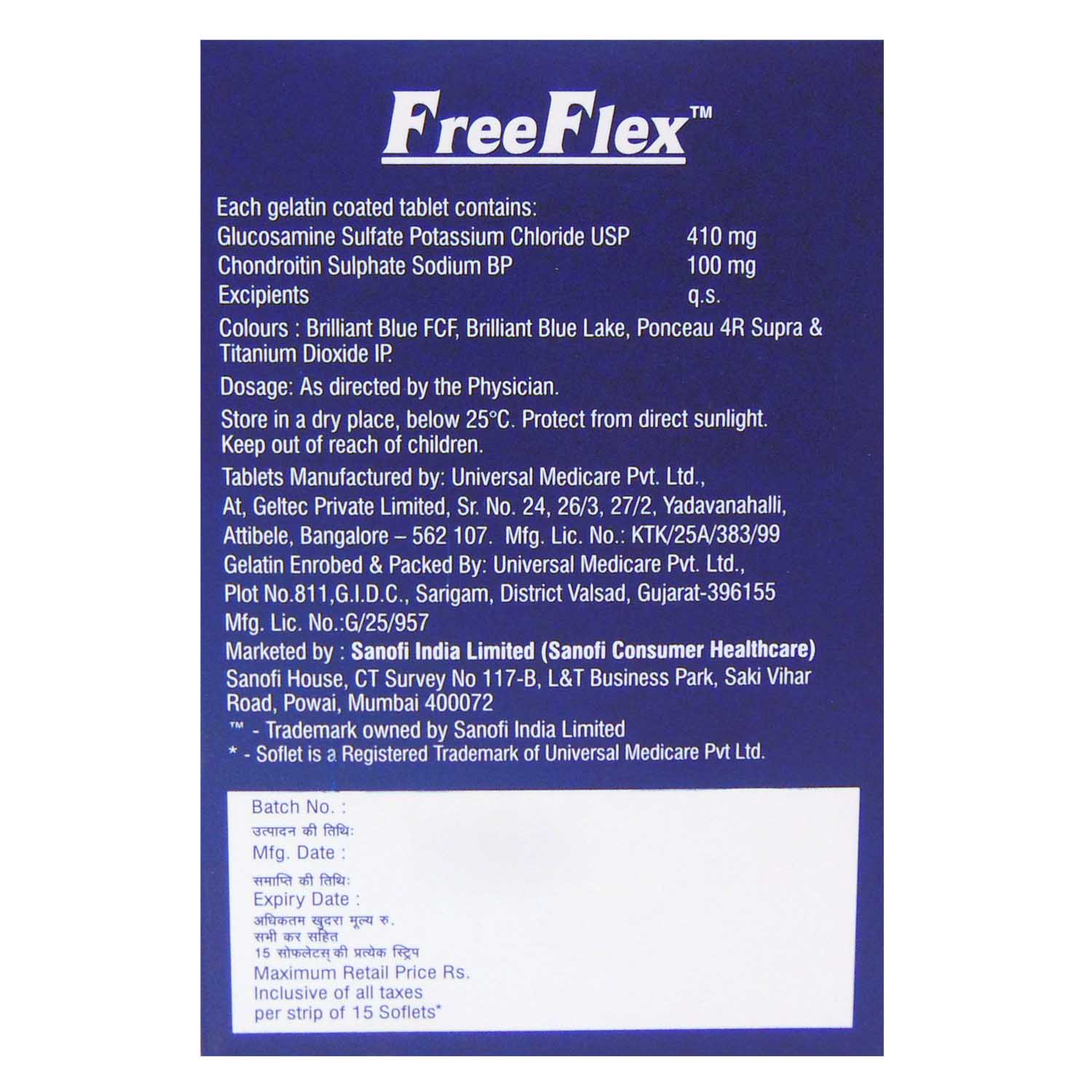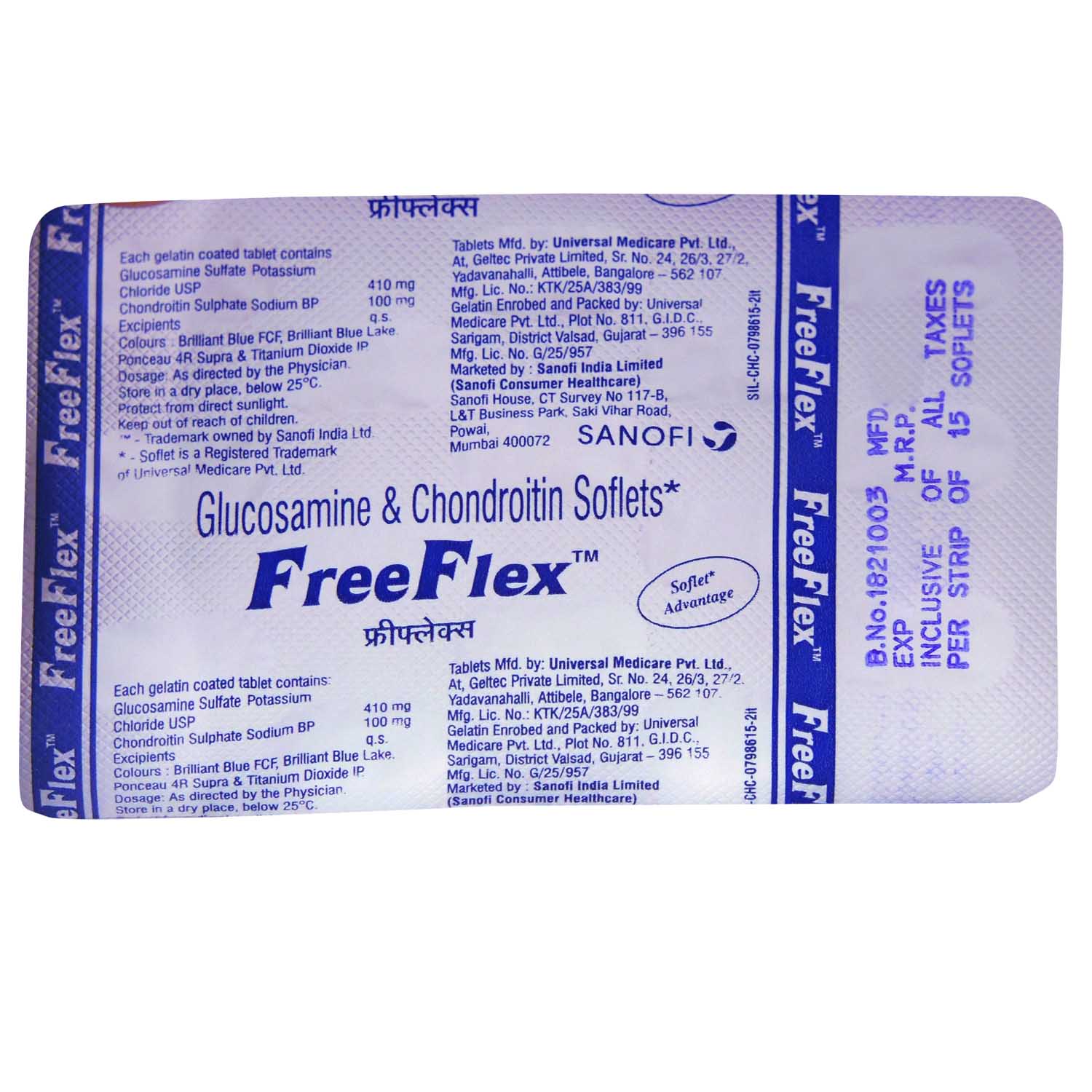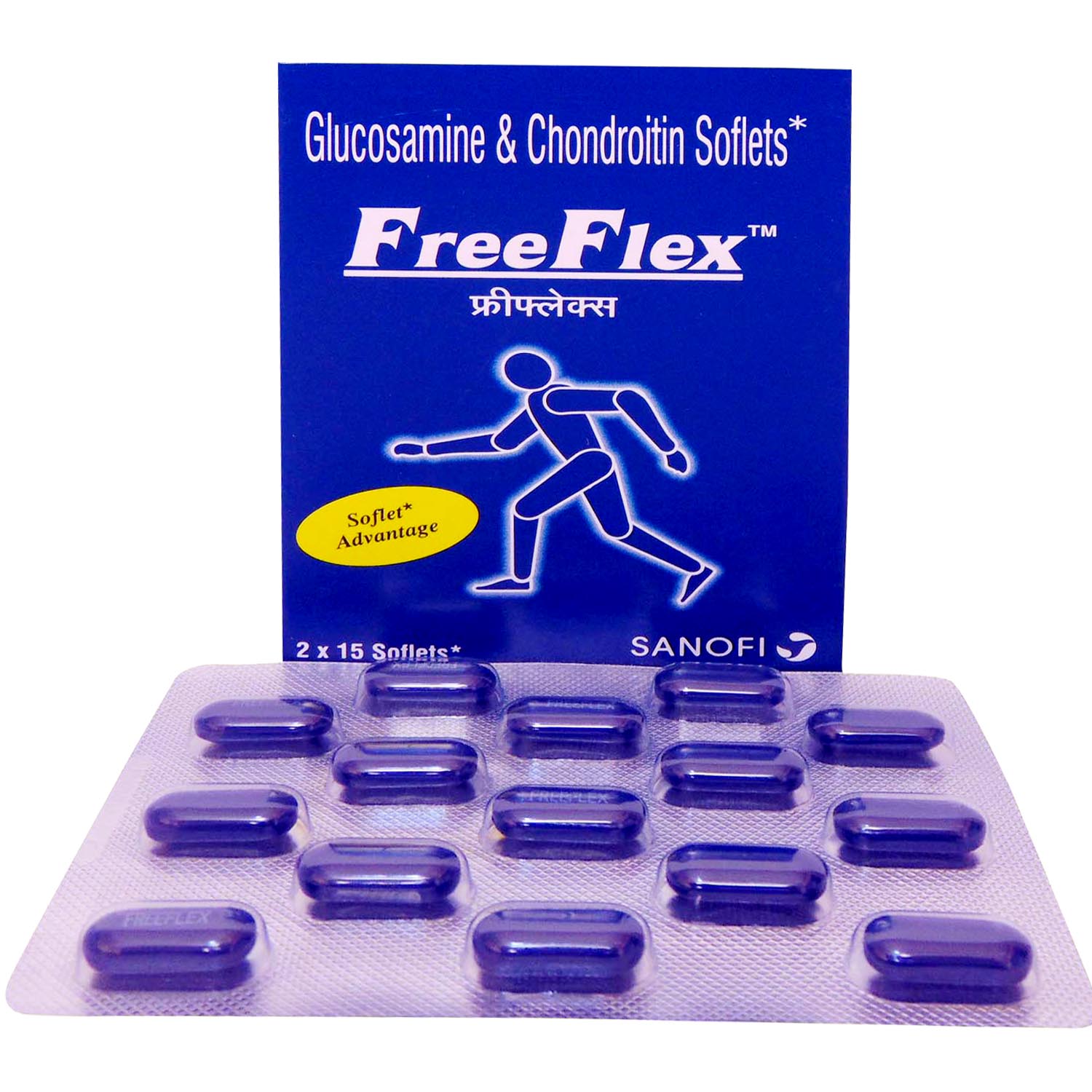Freeflex Soflets
MRP ₹279.48
(Inclusive of all Taxes)
₹41.9 Cashback (15%)



Available Offers
Therapeutic Class
Drug-Drug Interactions Checker List
Drug-Drug Interactions
Drug-Drug Interactions
Login/Sign Up
The combined use of Dicoumarol and Freeflex Tab 15's *** can increase the risk of unusual bleeding.
How to manage the interaction:
Co-administration of dicoumarol and Freeflex Tab 15's *** can lead to an interaction, it can be taken if advised by your doctor. However, if you experience any symptoms like unusual bleeding or bruising, vomiting, blood in your urine or stools, headache, dizziness, or weakness, consult the doctor immediately. Do not stop using any medications without a doctor's advice.
The combined use of Freeflex Tab 15's *** and warfarin can increase the risk of bleeding.
How to manage the interaction:
Co-administration of Freeflex Tab 15's *** and warfarin can lead to an interaction, it can be taken if advised by your doctor. However, if you experience any symptoms like unusual bleeding or bruising, vomiting, blood in your urine or stools, headache, dizziness, or weakness, consult the doctor immediately. Do not stop using any medications without a doctor's advice.
Drug-Food Interactions
Drug-Food Interactions
Login/Sign Up
Drug-Diseases Interactions
Drug-Diseases Interactions
Login/Sign Up
Drug Warnings
Side Effects of Freeflex Soflets
Directions for Use
Medicinal Benefits Mweb
Key Benefits
Uses of Freeflex Soflets
About Freeflex Soflets



Online payment accepted
know your delivery time
Provide Delivery Location
Therapeutic Class
All Substitutes & Brand Comparisons

Have a query?
Verified Buyers Reviews
Side Effects
Buy best Health & Nutrition products by
Others
AYUR
HIMALAYAN ORGANICS
WELLBEING NUTRITION
HEALTHVIT
APOLLO LIFE
HORLICKS
PURE NUTRITION
GNC
HAPPILO
KELLOGG S
APOLLO PHARMACY
ENSURE
Optimum Nutrition
SWISSE
Dabur
FAST&UP
ZANDU
MUSCLEBLAZE
Muscletech
SUGAR FREE
COMPLAN
KAPIVA
PROHANCE
QNT
Pediasure
THE VITAMIN COMPANY
VOGUE WELLNESS
CENTRUM
CUREVEDA
GLUCON-D
PROTINEX
BAIDYANATH
Millet Marvels
OZIVA
LION
ORIGIN
PENTASURE
RITEBITE
THE GOOD BUG
AYUSH KALP
RASAYANAM
MANNA
TRUE ELEMENTS
BOURNVITA
EQUAL
HIMALAYA
MY FITNESS
CALCIMAX
PATANJALI
SWADESHI
TONG GARDEN
BEAUTYWISE
ISOPURE
HEALTHYR-U
NESTLE RESOURCE
SAFFOLA
YOGABAR
B-PROTIN
BODYWELL
PINTOLA
Power Gummies
ULTRA D3
FITSPIRE
GALACT
GRD
INDIA HEMP ORGANICS
JIVA
NEUHERBS
NUTRASWISS
INJA
Performance Inspired
REVITAL
THREPTIN
Bolas
CELEVIDA
ENERZAL
ESSENTIAL
IN YOU
ORGANIC INDIA
PRO-PL
QUAKER
WEST COAST
BOOST
D-PROTIN
ENDURA MASS
ESPERER
FRESUBIN
GOFIGURE
HEALTHKART
OURDAILY
PROLYTE
SRI SRI TATTVA
VIVAMOM
Amocare
BAIDYANATH VANSAAR
BASIC AYURVEDA
BLACKMORES
BOLD CARE
ECOPROT
Vlado Sky Enterprise Pvt Ltd
Abbott India Ltd
Sun Pharmaceutical Industries Ltd
Apollo Healthco Limited
Zydus Healthcare Ltd
Macleods Pharmaceuticals Ltd
West Coast Pharmaceuticals Pvt Ltd
Intas Pharmaceuticals Ltd
Mankind Pharma Pvt Ltd
Meyer Organics Pvt Ltd
Emcure Pharmaceuticals Ltd
Lupin Ltd
Alkem Laboratories Ltd
Nutritionalab Pvt Ltd
Eris Life Sciences Ltd
Akumentis Healthcare Ltd
British Biologicals
La Renon Healthcare Pvt Ltd
Cipla Ltd
Micro Labs Ltd
Zuventus Healthcare Ltd
Torrent Pharmaceuticals Ltd
Pharmed Ltd
Dr Reddy's Laboratories Ltd
Modi Mundipharma Pvt Ltd
Corona Remedies Pvt Ltd
Hindustan Unilever Ltd
Indchemie Health Specialities Pvt Ltd
Apex Laboratories Pvt Ltd
Koye Pharmaceuticals Pvt Ltd
Leeford Healthcare Ltd
Bioceutics Inc
East West Pharma India Pvt Ltd
Alniche Life Sciences Pvt Ltd
FDC Ltd
Alembic Pharmaceuticals Ltd
Aristo Pharmaceuticals Pvt Ltd
DR Johns Lab Pharma Pvt Ltd
Herbs Nutriproducts Pvt Ltd
Guardian Healthcare Services Pvt Ltd
Vasu Organics Pvt Ltd
Pulse Pharmaceuticals
Fourrts India Laboratories Pvt Ltd
TTK Healthcare Ltd
Raptakos Brett & Co Ltd
USV Pvt Ltd
Glanbia Performance Nutrition India Pvt Ltd
Morepen Laboratories Ltd
Innovcare Life Sciences Pvt Ltd
Linux Laboratories Pvt Ltd
Troikaa Pharmaceuticals Ltd
Cadila Pharmaceuticals Ltd
Bright Lifecare Pvt Ltd
Wockhardt Ltd
Sanofi India Ltd
Primus Remedies Pvt Ltd
Zydus Cadila
Kellogg India Pvt Ltd
Tablets India Ltd
Indoco Remedies Ltd
Medley Pharmaceuticals Ltd
Overseas Health Care Pvt Ltd
Procter & Gamble Health Ltd
Shri Balaji Overseas
Dabur India Ltd
Ordain Health Care Global Pvt Ltd
Systopic Laboratories Pvt Ltd
Ajanta Pharma Ltd
Daris Biocare
Health & Happiness (H&H) Trading India Pvt Ltd
Hexagon Nutrition Pvt Ltd
Nutricia International Pvt Ltd
Zee Laboratories Ltd
Aareen Healthcare Pvt Ltd
Aeronutrix Sports Products Pvt Ltd
Emami Ltd
Radicool Pharmaceuticals Pvt Ltd
Wanbury Ltd
Biovitamins Pvt Ltd
Cadila Healthcare Ltd
Esmatrix Life Sciences Pvt Ltd
Ipca Laboratories Ltd
Klm Laboratories Pvt Ltd
Lloyd Healthcare Pvt Ltd
Sain Medicaments Pvt Ltd
Septalyst Lifesciences Pvt Ltd
Tas Med India Pvt Ltd
Wallace Pharmaceuticals Pvt Ltd
Biorex Healthcare Pvt Ltd
Elbrit Life Sciences Pvt Ltd
Levin Life Sciences Pvt Ltd
Panacea Biotec Ltd
Adret Retail Pvt Ltd
Cipla Health Ltd
Delcure Life Sciences Ltd
Femura Pharmaceuticals Pvt Ltd
Gladstone Pharma India Pvt Ltd
GlaxoSmithKline Consumer Healthcare Ltd
Kepler Healthcare Pvt Ltd
Ronyd Healthcare Pvt Ltd
SPECIALITY SUPPLEMENT
CALCIUM
IRON
VITAMIN D
COLLAGEN
VITAMIN B12
VITAMIN C
FISH OIL OMEGA
VITAMIN B
MULTIVITAMIN
Adult Nutrition Drink
ZINC
SEXUAL HEALTH SUPPLEMENT
WHEY PROTEIN
Kids Nutrition Drink
VITAMIN B9
ENERGY DRINK
SPECIALITY NUTRITION DRINK
DRY FRUIT
HERBAL JUICE
VITAMIN E
Prebiotic & Probiotic
ORS
SUGAR SUBSTITUTE
WOMEN & MOTHER NUTRITION DRINK
Chyawanprash
MAGNESIUM
Protein Bar
BREAKFAST CEREAL
Protein Powder
BIOTIN
DIABETIC NUTRITION DRINK
Honey
WEIGHT LOSS
Fat Burner
PLANT PROTEIN POWDER
VITAMIN B1
Apple Cider Vinegar
MELATONIN
APPETITE STIMULANT
Meal Replacement
Peanut Butter
AMINO ACID
Flax seed Oil
INFUSION TEA
NUT & SEED
Ashwagandha
Instant Food
OATS
Olive Oil
Mass Gainer
Pre Workout
CURCUMIN
POTASSIUM
VITAMIN A
DISKETTE
L-Carnitine
Cod Liver Oil
CREATINE
MILLETS & CEREALS
VITAMIN B6
ARGININE
COENZYME Q10
Shilajit
Appetite Suppressant
Chromium
MILK THISTLE
Glutathione
VITAMIN B2
VITAMIN K
L-Glutamine
MORINGA
GARCINIA CAMBOGIA
GREEN TEA
SPIRULINA
ALPHA-LIPOIC ACID
GLUCOSAMINE
GOKSHURA
BCAA Protein Powder
GILOY
NEEM
SAFFRON
SELENIUM
TRIPHALA
Tulsi
VITAMIN B3
VITAMIN B5
Brahmi
CANDIES
FRUIT JUICE
Face Gel
Specialty Supplements
WEIGHT GAINER
WHEAT GRASS POWDER



